This handles the "line of sight" for players and monsters. More...

Go to the source code of this file.
Data Structures | |
| struct | blstr |
Defines | |
| #define | SPACE_BLOCK 0.5 |
| Distance must be less than this for the object to be blocked. | |
Typedefs | |
| typedef struct blstr | blocks |
Functions | |
| static void | blinded_sight (object *op) |
| Sets all veiwable squares to blocked except for the one the central one that the player occupies. | |
| static void | check_wall (object *op, int x, int y) |
| Used to initialise the array used by the LOS routines. | |
| void | clear_los (object *op) |
| Clears/initialises the los-array associated to the player controlling the object. | |
| static void | expand_lighted_sight (object *op) |
| Propagate the light information. | |
| static void | expand_sight (object *op) |
| Goes through the array of what the given player is able to see, and expands the visible area a bit, so the player will, to a certain degree, be able to see into corners. | |
| int | has_carried_lights (const object *op) |
| Checks if op has a light source. | |
| void | init_block (void) |
| initialises the array used by the LOS routines. | |
| void | make_sure_not_seen (const object *op) |
| The object which is supposed to be visible through walls has just been removed from the map, so update the los of any players within its range. | |
| void | make_sure_seen (const object *op) |
| The object is supposed to be visible through walls, thus check if any players are nearby, and edit their LOS array. | |
| void | print_los (object *op) |
| Debug-routine which dumps the array which specifies the visible area of a player. | |
| static void | set_block (int x, int y, int bx, int by) |
| What this sets is that x,y blocks the view of bx,by This then sets up a relation - for example, something at 5,4 blocks view at 5,3 which blocks view at 5,2 etc. | |
| static void | set_wall (object *op, int x, int y) |
| This recursively sets the blocked line of sight view. | |
| void | update_all_los (const mapstruct *map, int x, int y) |
| This function makes sure that update_los() will be called for all players on the given map within the next frame. | |
| void | update_all_map_los (mapstruct *map) |
| update all_map_los is like update_all_los() below, but updates everyone on the map, no matter where they are. | |
| void | update_los (object *op) |
| Recalculates the array which specifies what is visible for the given player-object. | |
Variables | |
| static blocks | block [MAP_CLIENT_X][MAP_CLIENT_Y] |
Detailed Description
This handles the "line of sight" for players and monsters.
Definition in file los.c.
Define Documentation
| #define SPACE_BLOCK 0.5 |
Distance must be less than this for the object to be blocked.
An object is 1.0 wide, so if set to 0.5, it means the object that blocks half the view (0.0 is complete block) will block view in our tables. .4 or less lets you see through walls. .5 is about right.
Definition at line 46 of file los.c.
Referenced by init_block().
Typedef Documentation
Function Documentation
| static void blinded_sight | ( | object * | op | ) | [static] |
Sets all veiwable squares to blocked except for the one the central one that the player occupies.
A little odd that you can see yourself (and what your standing on), but really need for any reasonable game play.
- Parameters:
-
op player's object for which to reset los. Must have a valid contr.
Definition at line 450 of file los.c.
Referenced by update_los().

| static void check_wall | ( | object * | op, |
| int | x, | ||
| int | y | ||
| ) | [static] |
Used to initialise the array used by the LOS routines.
- Parameters:
-
op player's object x y Values based on MAP_CLIENT_X and Y that index the blocked[][] arrays.
- Todo:
- use player *instead of object *to show it must be a player?
Definition at line 220 of file los.c.
References get_map_flags(), MAP_CLIENT_X, MAP_CLIENT_Y, P_BLOCKSVIEW, P_OUT_OF_MAP, and set_wall().
Referenced by update_los().
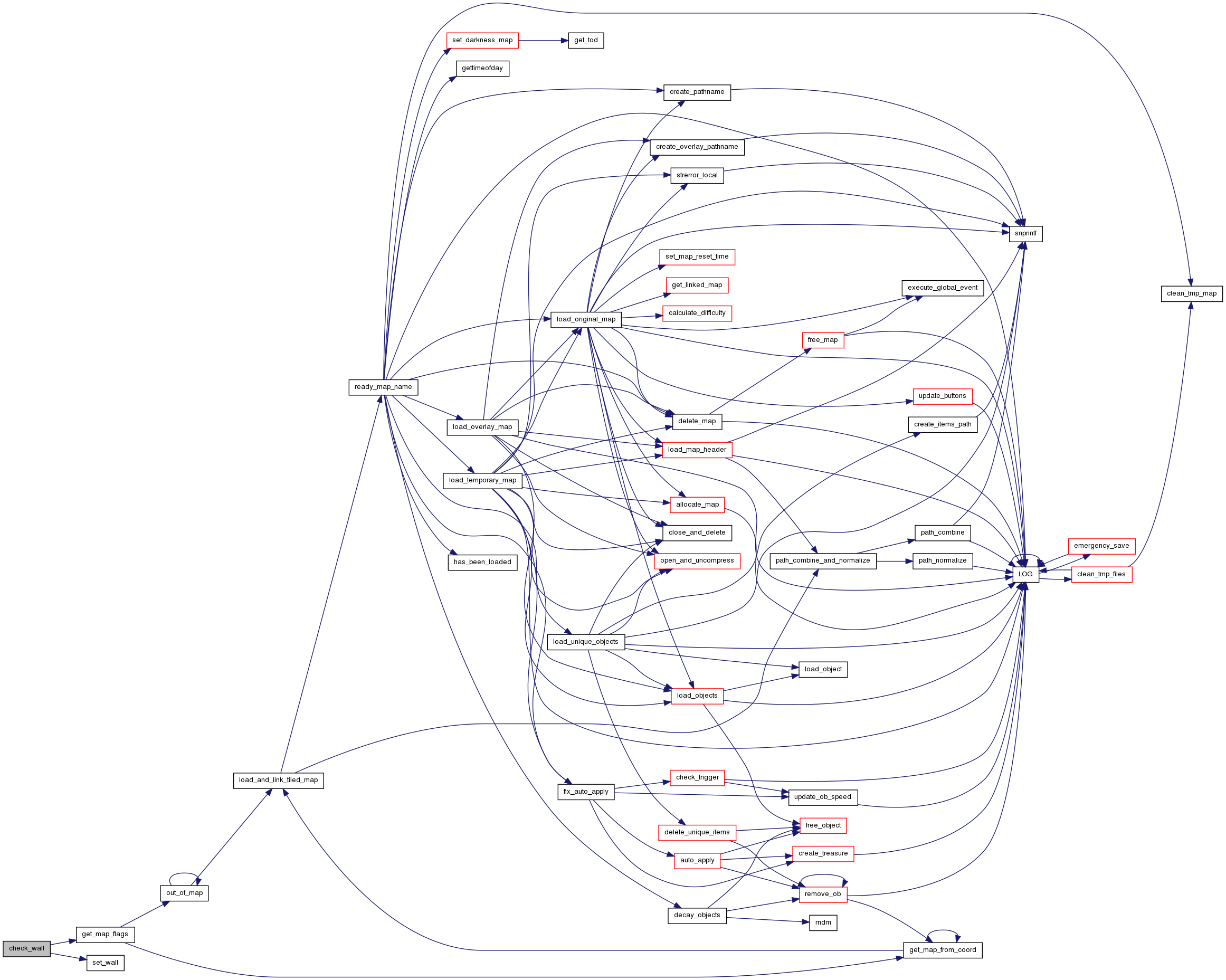

| void clear_los | ( | object * | op | ) |
Clears/initialises the los-array associated to the player controlling the object.
- Parameters:
-
op player's object.
- Todo:
- use player *instead of object *to show it must be a player?
Definition at line 258 of file los.c.
References MAP_CLIENT_X, and MAP_CLIENT_Y.
Referenced by do_wizard_dm(), get_player(), and update_los().
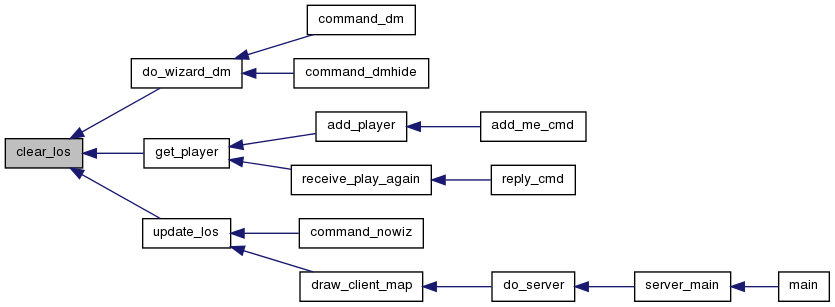
| static void expand_lighted_sight | ( | object * | op | ) | [static] |
Propagate the light information.
- Parameters:
-
op player's object for which to compute the light values.
Definition at line 336 of file los.c.
References FLAG_SEE_IN_DARK, get_map_flags(), GET_MAP_LIGHT, isqrt(), llevError, LOG(), MAP_DARKNESS, MAX, MAX_DARKNESS, MAX_LIGHT_RADII, MIN, P_OUT_OF_MAP, and QUERY_FLAG.
Referenced by expand_sight().
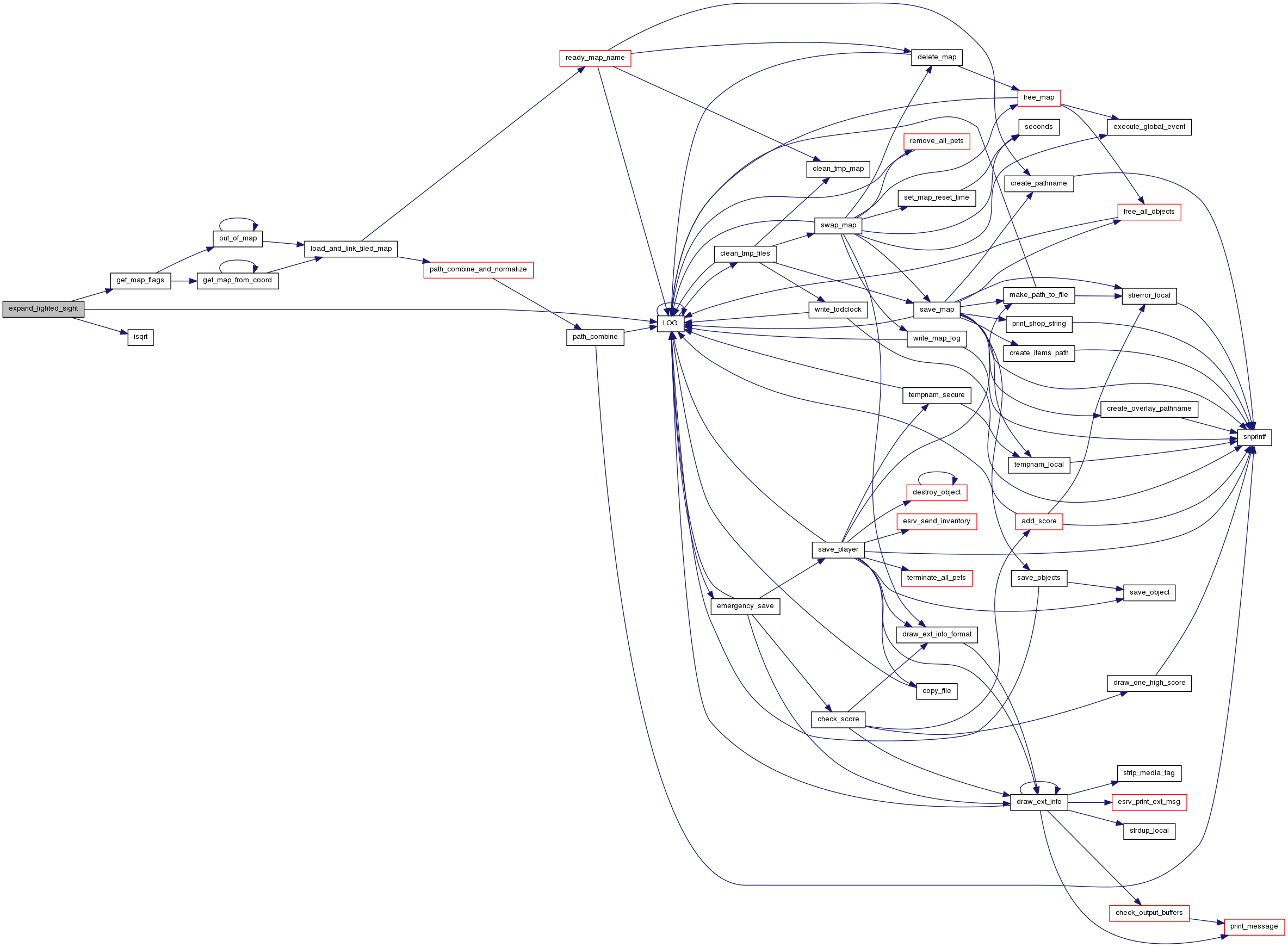

| static void expand_sight | ( | object * | op | ) | [static] |
Goes through the array of what the given player is able to see, and expands the visible area a bit, so the player will, to a certain degree, be able to see into corners.
This is somewhat suboptimal, would be better to improve the formula.
- Parameters:
-
op player's object to process.
- Todo:
- use player *instead of object *to show it must be a player?
Definition at line 278 of file los.c.
References expand_lighted_sight(), freearr_x, freearr_y, get_map_flags(), MAP_DARKNESS, P_BLOCKSVIEW, and P_OUT_OF_MAP.
Referenced by update_los().
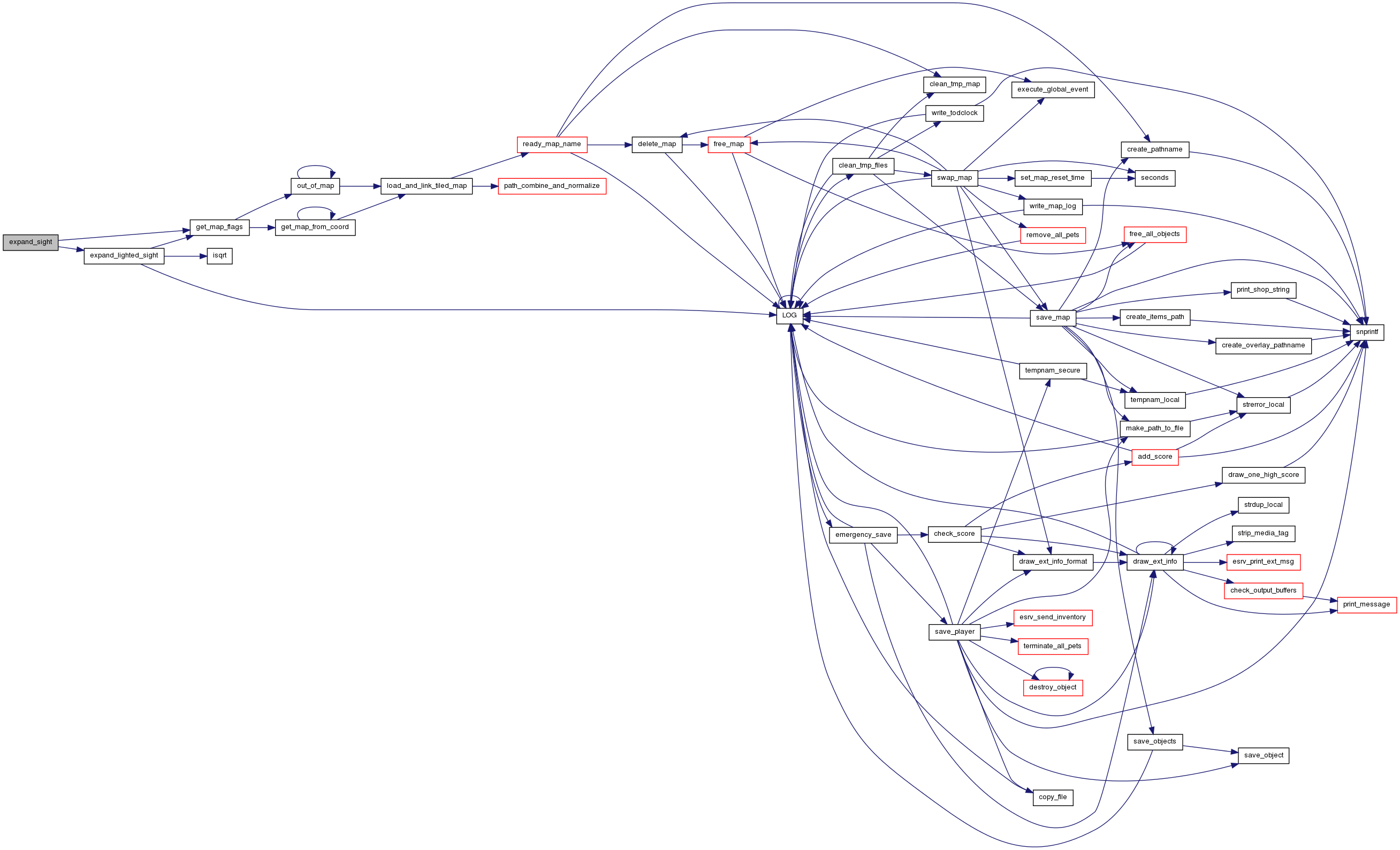

| int has_carried_lights | ( | const object * | op | ) |
Checks if op has a light source.
- Parameters:
-
op object being checked.
- Returns:
- true if op carries one or more lights
- Note:
- This is a trivial function now days, but it used to be a bit longer. Probably better for callers to just check the op->glow_radius instead of calling this.
Definition at line 322 of file los.c.
Referenced by can_see_enemy(), and hideability().
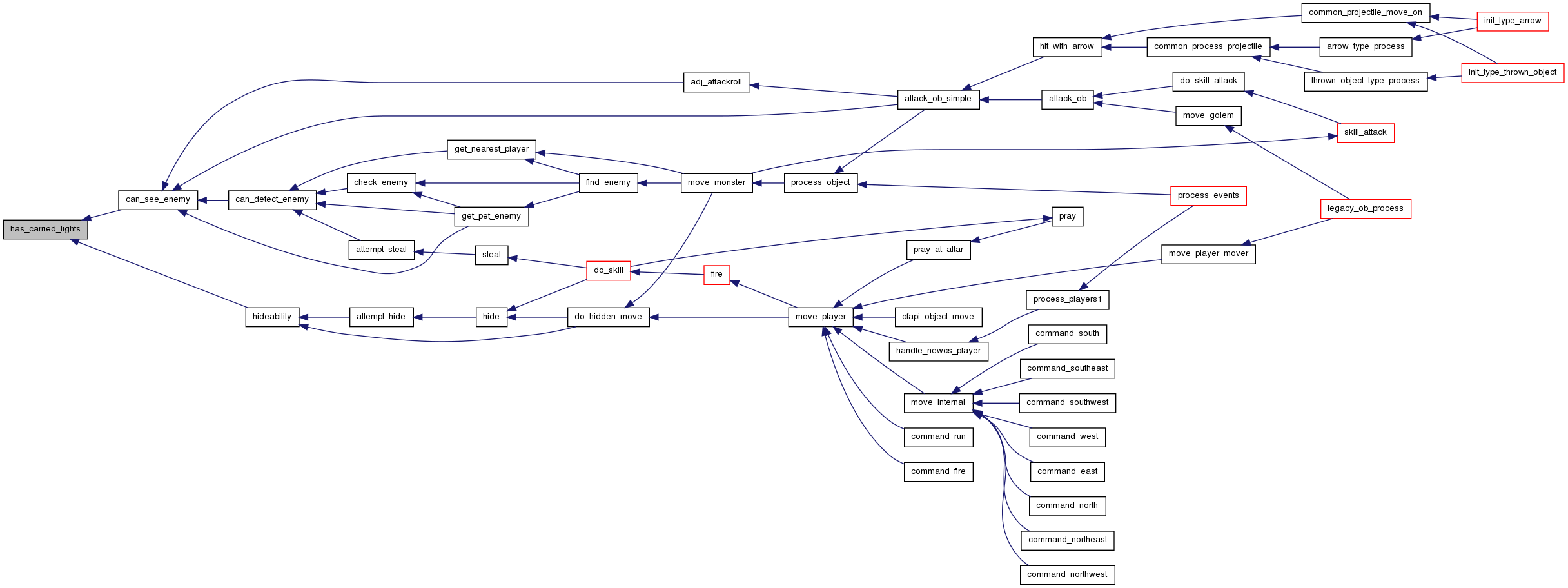
| void init_block | ( | void | ) |
initialises the array used by the LOS routines.
Since we are only doing the upper left quadrant, only these spaces could possibly get blocked, since these are the only ones further out that are still possibly in the sightline.
Definition at line 102 of file los.c.
References FABS, blstr::index, MAP_CLIENT_X, MAP_CLIENT_Y, set_block(), and SPACE_BLOCK.
Referenced by cctk_init_std_archetypes(), and init_library().
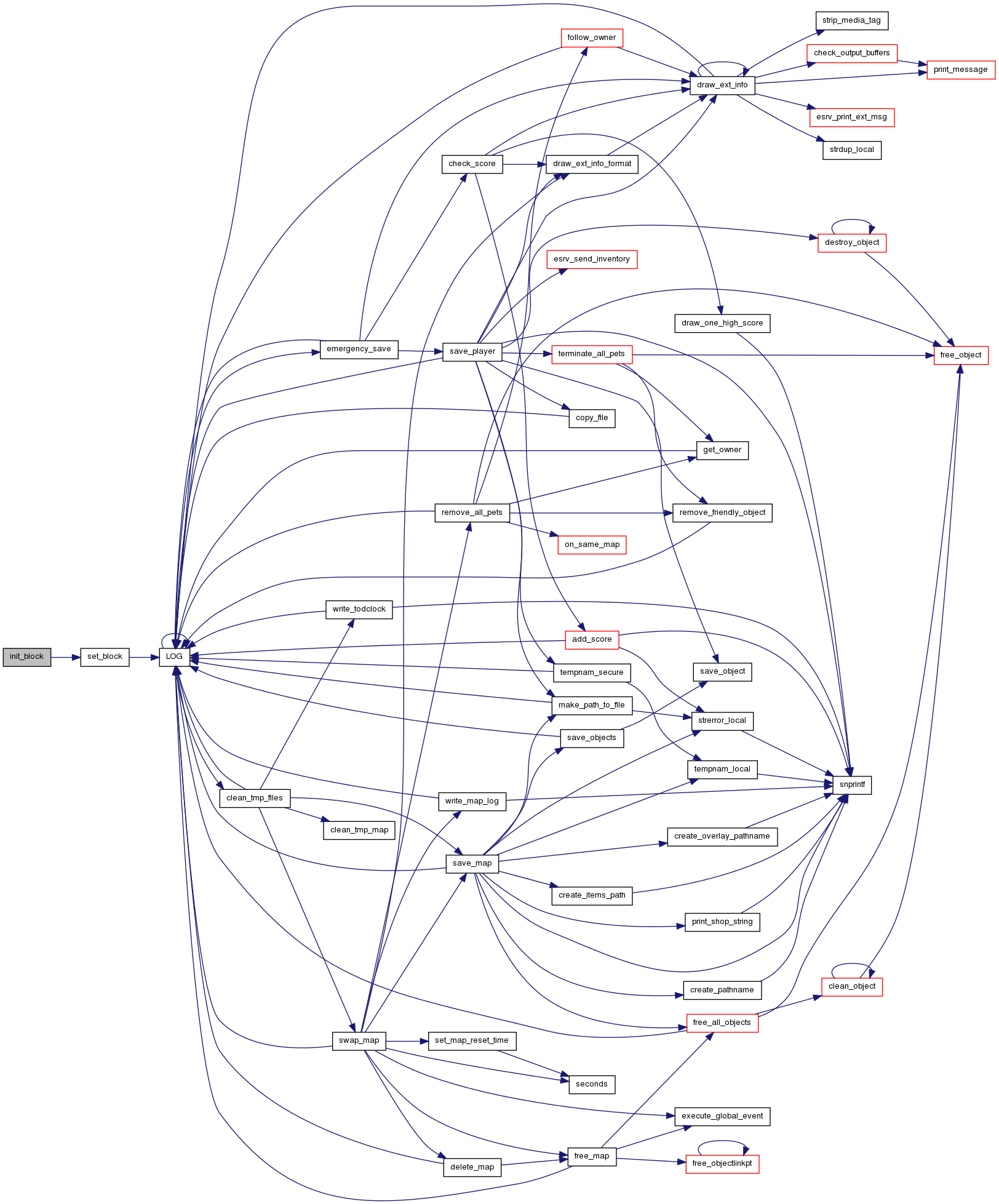

| void make_sure_not_seen | ( | const object * | op | ) |
The object which is supposed to be visible through walls has just been removed from the map, so update the los of any players within its range.
- Parameters:
-
op object that disappears.
- Todo:
- what about tiled maps?
Definition at line 667 of file los.c.
References pl::do_los, first_player, socket_struct::mapx, socket_struct::mapy, pl::next, pl::ob, and pl::socket.
Referenced by process_object().

| void make_sure_seen | ( | const object * | op | ) |
The object is supposed to be visible through walls, thus check if any players are nearby, and edit their LOS array.
- Parameters:
-
op object that should be visible.
- Todo:
- what about tiled maps?
Definition at line 644 of file los.c.
References pl::blocked_los, first_player, socket_struct::mapx, socket_struct::mapy, pl::next, pl::ob, and pl::socket.
Referenced by process_object().

| void print_los | ( | object * | op | ) |
Debug-routine which dumps the array which specifies the visible area of a player.
Triggered by the DM command printlos.
- Parameters:
-
op DM asking for information.
- Todo:
- change the command to view another player's LOS?
Definition at line 614 of file los.c.
References draw_ext_info(), MAP_CLIENT_X, MSG_TYPE_COMMAND, MSG_TYPE_COMMAND_DEBUG, NDI_UNIQUE, and snprintf().
Referenced by command_printlos().
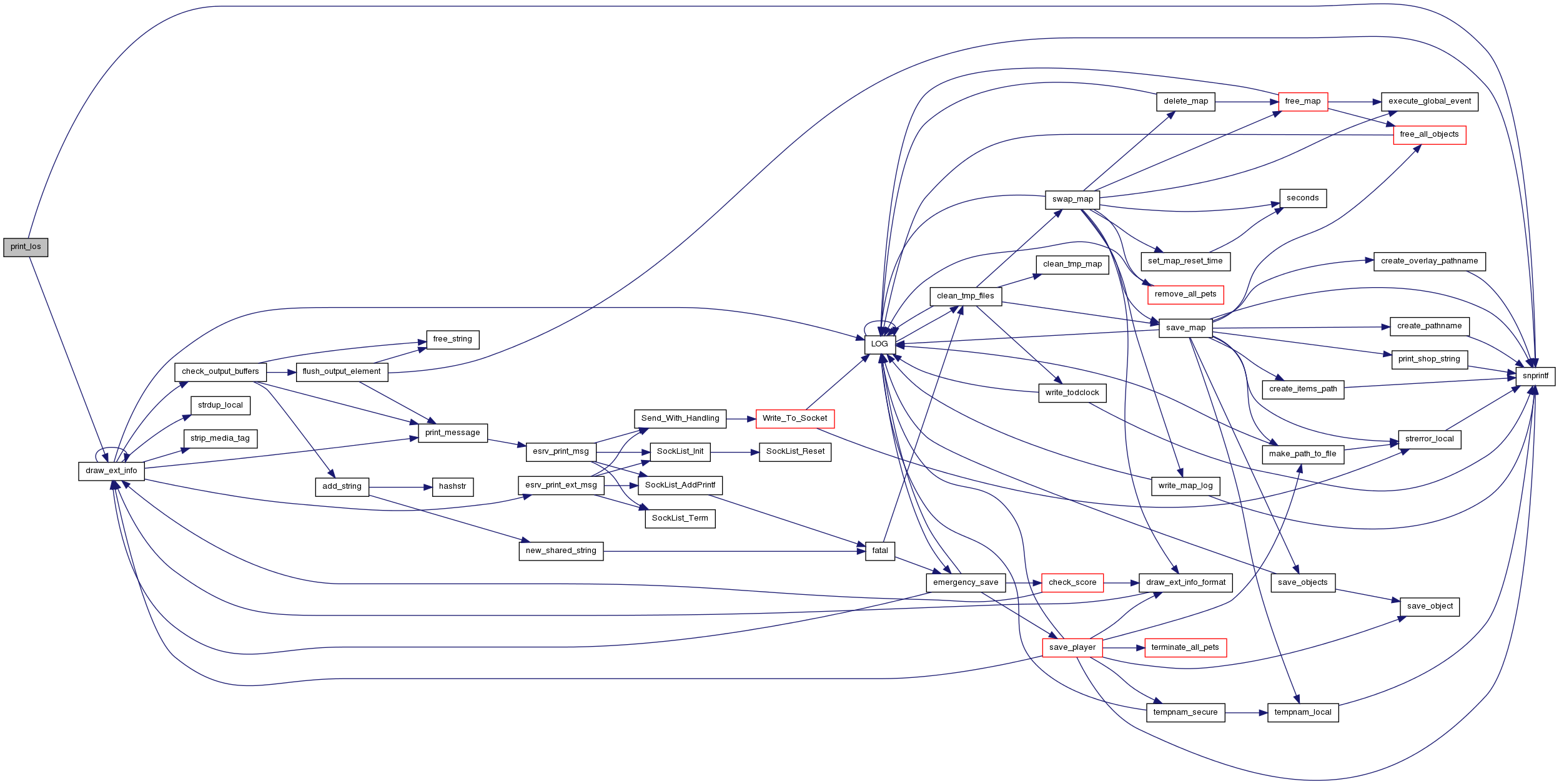

| static void set_block | ( | int | x, |
| int | y, | ||
| int | bx, | ||
| int | by | ||
| ) | [static] |
What this sets is that x,y blocks the view of bx,by This then sets up a relation - for example, something at 5,4 blocks view at 5,3 which blocks view at 5,2 etc.
So when we check 5,4 and find it blocks, we have the data to know that 5,3 and 5,2 and 5,1 should also be blocked. Used to initialise the array used by the LOS routines.
- Parameters:
-
x y coordinates that block. bx by coordinates that get blocked.
- Todo:
- check index for overflow?
Definition at line 75 of file los.c.
References blstr::index, llevDebug, LOG(), blstr::x, and blstr::y.
Referenced by init_block().
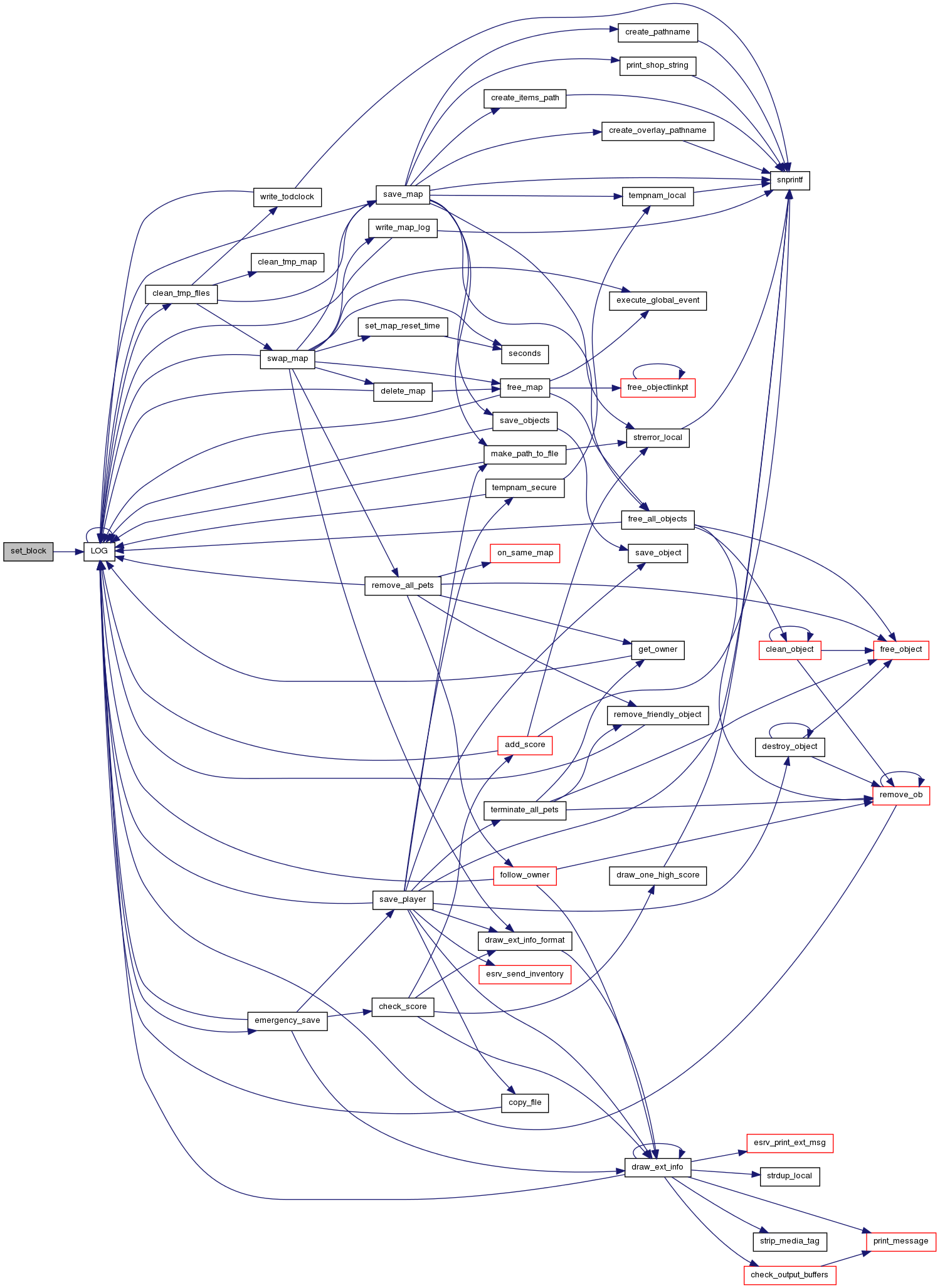

| static void set_wall | ( | object * | op, |
| int | x, | ||
| int | y | ||
| ) | [static] |
This recursively sets the blocked line of sight view.
From the blocked[][] array, we know for example that if some particular space is blocked, it blocks the view of the spaces 'behind' it, and those blocked spaces behind it may block other spaces, etc. In this way, the chain of visibility is set. Used to initialise the array used by the LOS routines.
- Parameters:
-
op player for which we're computing. x y indexes into the blocked[][] array.
Definition at line 185 of file los.c.
References blstr::index, MAP_CLIENT_X, MAP_CLIENT_Y, blstr::x, and blstr::y.
Referenced by check_wall().

| void update_all_los | ( | const mapstruct * | map, |
| int | x, | ||
| int | y | ||
| ) |
This function makes sure that update_los() will be called for all players on the given map within the next frame.
It is triggered by removal or inserting of objects which blocks the sight in the map. Modified by MSW 2001-07-12 to take a coordinate of the changed position, and to also take map tiling into account. This change means that just being on the same map is not sufficient - the space that changes must be withing your viewable area.
- Parameters:
-
map map that changed. x y coordinates of the change.
- Todo:
- check if this couldn't be simplified, especially tiling (isn't there a function somewhere that could help?)
Definition at line 544 of file los.c.
References pl::do_los, first_player, MAP_HEIGHT, MAP_WIDTH, socket_struct::mapx, socket_struct::mapy, pl::next, pl::ob, pl::socket, and mapdef::tile_map.
Referenced by cfapi_object_set_property(), do_turn(), gate_type_process(), insert_ob_in_map(), insert_ob_in_ob(), kill_object(), magic_wall(), remove_ob(), and tear_down_wall().
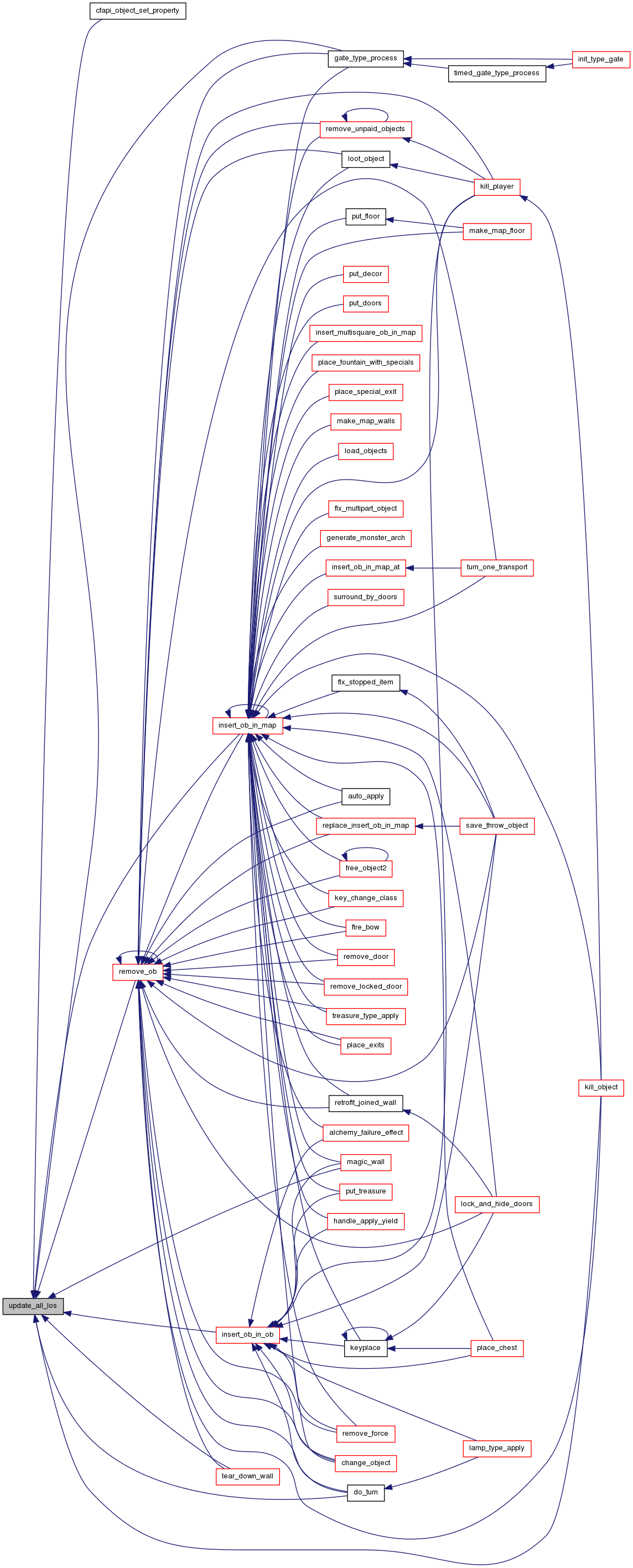
| void update_all_map_los | ( | mapstruct * | map | ) |
update all_map_los is like update_all_los() below, but updates everyone on the map, no matter where they are.
This generally should not be used, as a per specific map change doesn't make much sense when tiling is considered (lowering darkness would certainly be a strange effect if done on a tile map, as it makes the distinction between maps much more obvious to the players, which is should not be. Currently, this function is called from the change_map_light function
- Parameters:
-
map map on which affected players are.
Definition at line 516 of file los.c.
References pl::do_los, first_player, pl::next, and pl::ob.
Referenced by change_map_light().
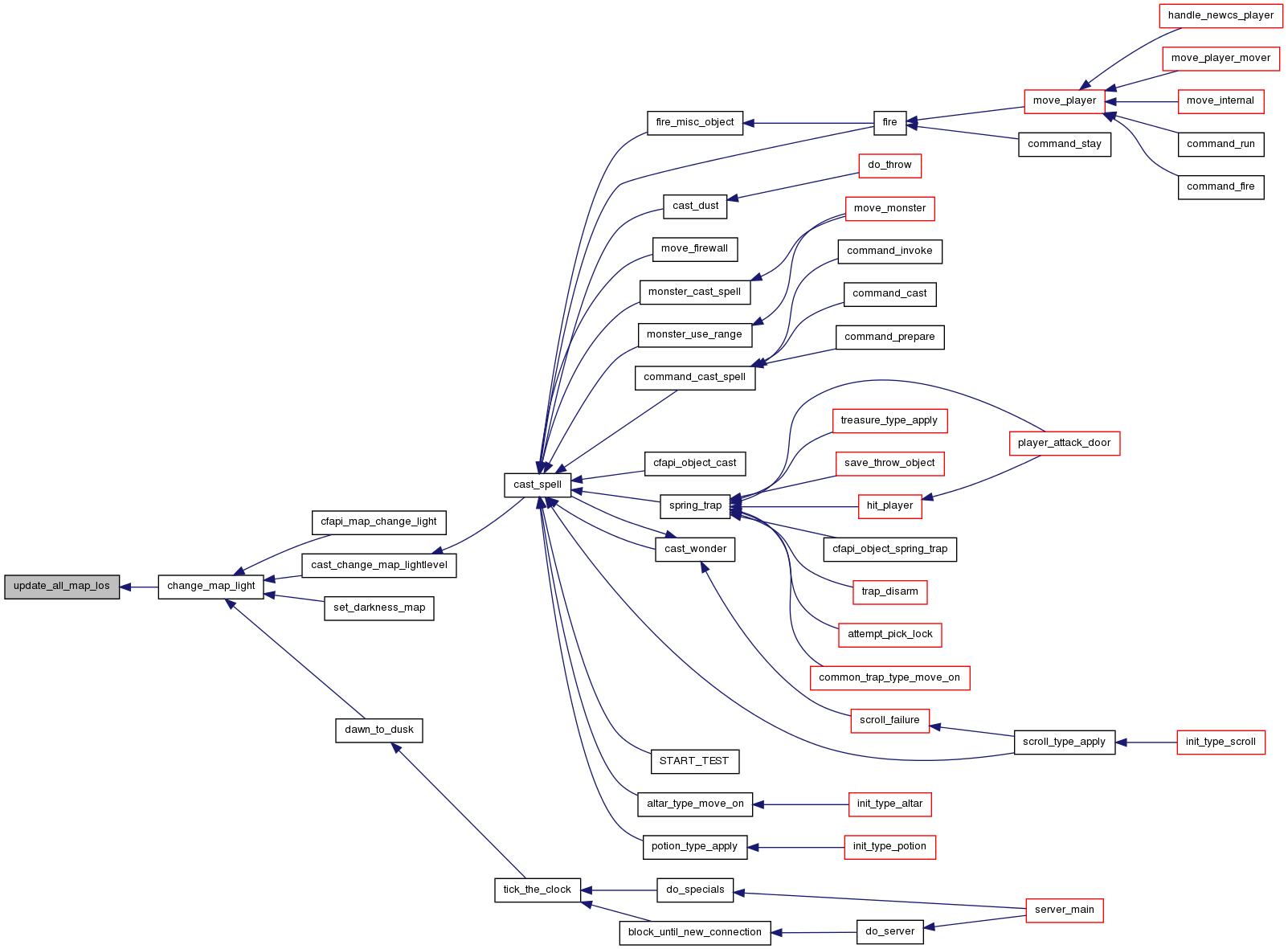
| void update_los | ( | object * | op | ) |
Recalculates the array which specifies what is visible for the given player-object.
- Parameters:
-
op player's object for which to compute.
Definition at line 467 of file los.c.
References blinded_sight(), check_wall(), clear_los(), expand_sight(), FLAG_BLIND, FLAG_REMOVED, FLAG_WIZ, FLAG_XRAYS, MAP_CLIENT_X, MAP_CLIENT_Y, and QUERY_FLAG.
Referenced by command_nowiz(), and draw_client_map().
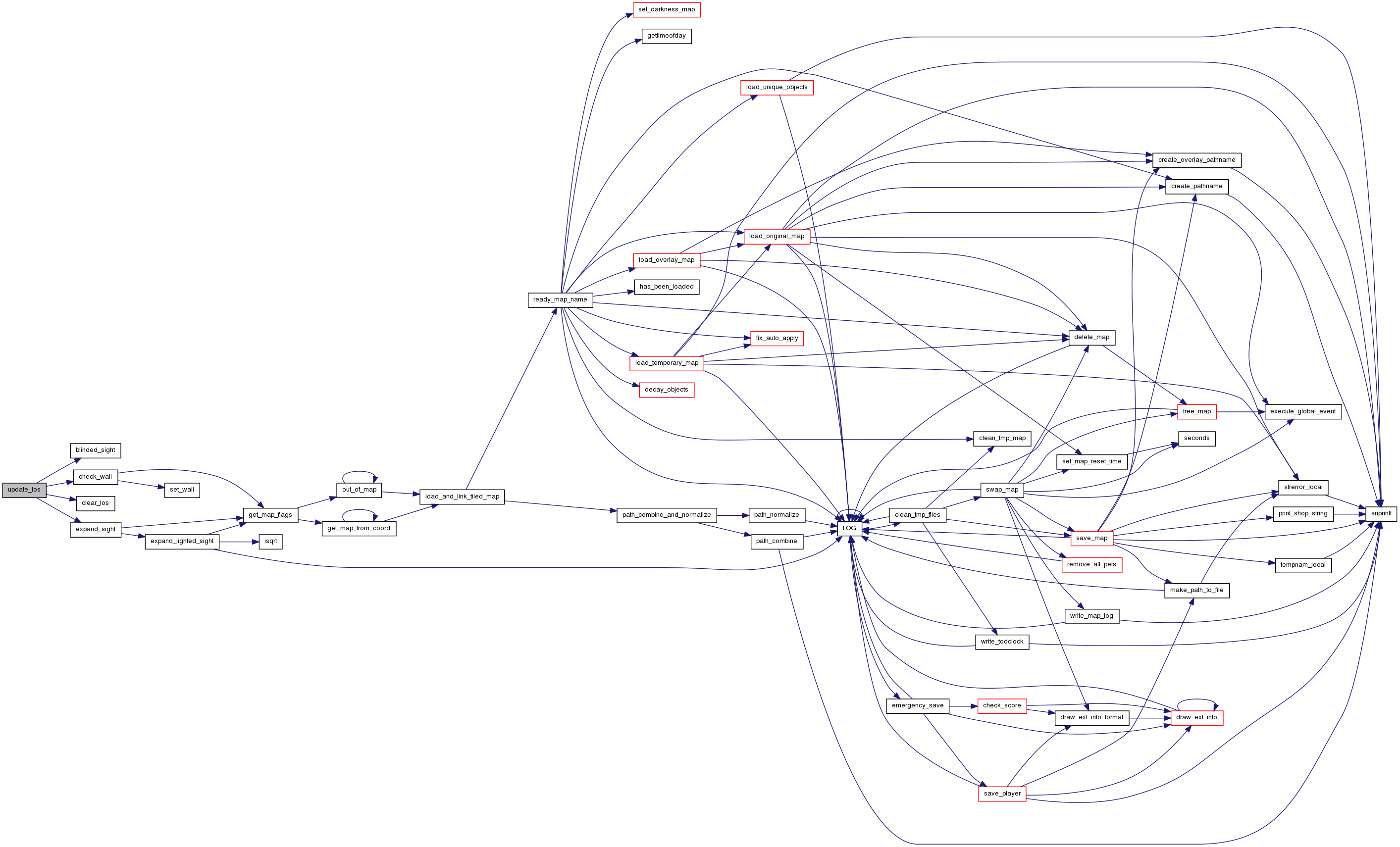

Variable Documentation
blocks block[MAP_CLIENT_X][MAP_CLIENT_Y] [static] |
 1.7.6.1
1.7.6.1